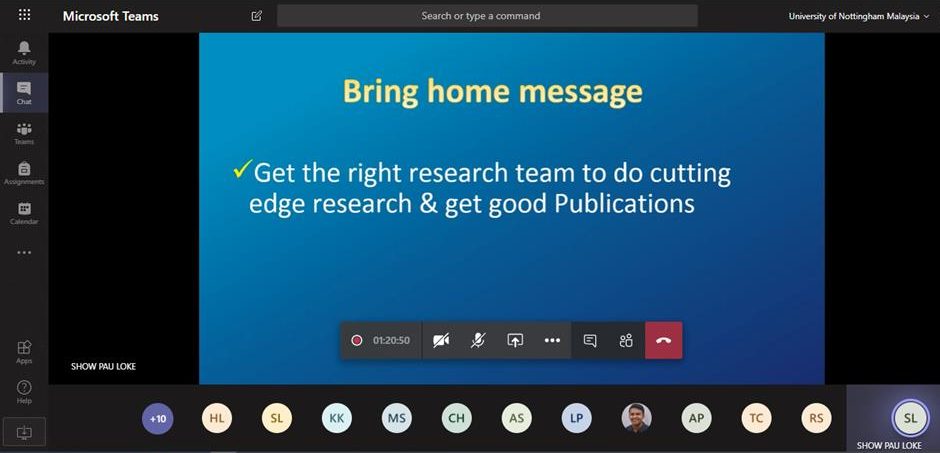
May 6, 2020, by Lisa Chin
Getting published
Even groundbreaking research is useless if it does not get published
We often come across this phrase when we talk about scholarly publication. We also often hear this famous aphorism, publish or perish, especially in academia. These phrases speak volumes about the importance of publishing which is at the heart of research, an essential step in the research life cycle.
An introductory session on all things about publication
But getting published requires knowledge of the know-hows. In this regard, we organised a virtual session delving into the topic of getting published on Thursday 30 April 2020 using MS Teams. We initiated this focused group session with senior research academics and PhD students to discuss and share best practices in scholarly writing and publishing, with particular emphasis on publishing during PhD journey, using the 5W1H method (What, Why, Where, When, Who and How). The hour-and-a-half session was remotely joined by around 20 of our postgraduate students.
In addition to the insights from our trainer, Dr Revathy Sankaran, the session featured a lineup of guest presenters from the Department of Chemical & Environmental Engineering, namely: Ir Ts Dr Show Pau-Loke, Associate Professor and Director of Research; Apurav Krishna Koyande, 2nd year PhD student; and Angela Paul Peter, 1st year MPhil student. The session was moderated by Dr Tissa Chandesa, Research Training Development Manager.
Apart from the reiteration of the importance of publishing, with particular reference to academia, the session covered a range of areas, with focal point on:
-
Scholarly writing
Dr Sankaran shared some practical advice and recommendations in writing a good journal paper. “Ask yourself these questions: Does your research contribute to a significant advancement? Have your experiments tested your hypothesis? Are the parameters or controls appropriate and sufficient?”, said Dr Sankaran, “put extra effort in writing your abstract to make sure it is concise and clear and your tables and figures should be self-explanatory!” As the saying goes ‘a figure is worth a thousand words’, Angela recommended the use of a software called Edraw to prepare illustrations, including figures and tables, for well-conceived result presentations. “In planning and setting my writing goals, deadlines and timelines help!” said Apurav.
-
Journal selection
When you are ready to publish your research work, it is equally important to find the right place to do so. Finding the right publication can be a time consuming task but it is vital to get your research out to the right audience. There are several different factors to consider when selecting a publication for your research. Drawing on his extensive background as a researcher who has published more than 230 high impact papers in less than 7 years, Dr Show explained about the life-cycle of publication – write, submit, publish. He further delved into some frequently asked questions on where to publish, how to choose a right journal and how to define a quality publication. On the other hand, Dr Sankaran examined two bibliographic databases, Scopus and ISI.
-
Publication process
Just like landing a good job is hard without a well-crafted CV and interview skills, getting a paper published is hard without understanding the publication process. “This is especially so for top and high impact journals,” said Dr Show. Good journals and publishers have a very high rejection rate. “It is important to have a network of international research collaborators,” he continued. Based on his personal experience, Apurav talked about receiving very discouraging comments from the reviewers. “So how do you tackle the harsh criticism? I came to a realisation that I need to address it and justify my work skillfully and politely,” said Apurav. “Carefully prepare your response and be tactful,” advised Dr Sankaran. In short, it is important to interpret criticism correctly and address it without sounding defensive.
We received some very encouraging feedback from the participants. One of the participants wrote, “A great session to expand our publication horizons.” We know how rigorous and challenging the process of writing and publishing is and so we are pleased to know that the session was useful for our postgraduate students in gaining knowledge and insights into the world of scholarly publication.
Special thanks to Dr Show, Apurav and Angela for their time and sharing of valuable insights.
For any enquiries or more information, please contact us at graduateschool@nottingham.edu.my.
-
Post a comment

